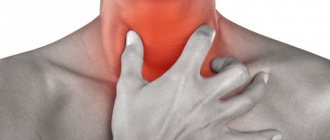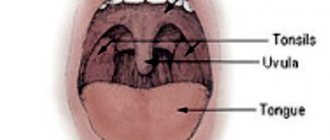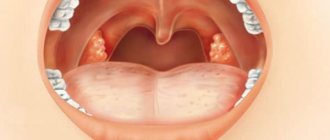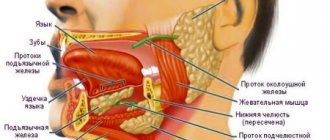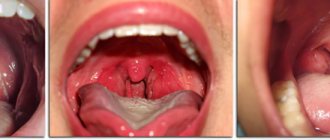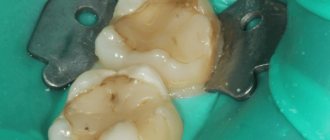How does inflammation occur?
About 70% of acute inflammatory diseases of the pharynx are caused by viruses2. In acute viral infections, the most common symptoms include: sore throat, weakness, cough, and fever. In children it is high (38 degrees and above), and in adults it is within 37-38 degrees. Of course, the intensity of the temperature depends on the specific pathogen: for example, during the flu it rises sharply above 38 degrees, and rhinoviruses, for example, practically do not cause high fever. In addition, other symptoms appear: headache, sweating, chills.
Today, about 250 viruses are known that can cause a “cold.” The most common of them are rhinoviruses, adenoviruses, Epstein-Barr virus, Coxsackie virus, coronavirus1.
In addition to viruses, acute inflammation of the pharynx is caused by bacterial and fungal infections. The most common cause of sore throat is streptococcus pyogenes. A bacterial infection feels almost no different from a viral one: the same high temperature, the same manifestations of intoxication. But it is possible to become infected with several bacteria at once - for example, streptococcus and Staphylococcus aureus. These bacteria are dangerous because... can provoke the development of pneumonia, therefore, if the temperature rises sharply and you feel weak and dizzy, you should urgently consult a doctor to determine the disease. There are also rapid tests that quickly help determine the cause of the disease (for example, the causative agent of a sore throat) even at home.
Don't discount fungal flora either. The most common pathogen in this case is the fungus Candida albicans, better known among the people as the “causative agent of thrush” - they cause almost every second fungal inflammatory process of the nasopharynx3.
But the most common option is mixed flora. The virus that originally caused the disease “prepares the ground” for a bacterial infection, which easily develops on the inflamed mucous membrane, which has lost its natural protective properties. Taking certain antibiotics can also become a catalyst, in which case a fungal infection will occur.
Prolonged sore throat is caused by bacteria and fungi, which are a source of chronic infection, for example, with sinusitis, tonsillitis or caries.
In children, constant soreness can be caused by inflammation of the palatine tonsil - adenoiditis - with the main irritating factor being the inflammatory secretions flowing down the back wall of the pharynx.
Other pathological processes
Multiple in nature. We are talking about the following conditions:
- Poor circulation in the area of the esophagus and the initial parts of the lower respiratory tract.
- Tumors of the upper respiratory tract. Both malignant and benign.
- Disorders of the innervation of the upper respiratory tract.
- Also pathological phenomena in the brain. Generalized innervation disorders are possible.
- Chemical, thermal and other types of damage to the respiratory system.
- Finally, banal “overdrying” of tissues is possible as a result of insufficient humidification of the surrounding atmospheric air.
All these are the reasons for a sore throat for a long time.
How to get rid of a sore throat
Considering that a sore throat is most often caused by viruses, antibiotics will not help, but, on the contrary, can aggravate the problem by disrupting the balance of microflora and promoting the development of fungus.
The only exception is the appearance of severe pain and sore throat due to a sore throat. The most dangerous sore throat is caused by infection with group A beta hemolytic streptococcus (GABHS). GABHS can be detected in 5 minutes both at a doctor’s appointment and at home using a test. The infection affects the tonsils, causing high fever (up to 40 degrees), severe sore throat, which makes it difficult to swallow. During a sore throat, the tonsils are enlarged, red, covered with plaque or pus.
Such a sore throat caused by GABHS must be treated with antibiotics so that serious complications from the heart, kidneys and joints do not occur. But a doctor must prescribe antibiotics.
In all other cases, it is better to limit yourself to local remedies. Rinsing with herbs or a simple salt solution is a good way to relieve the condition - just not a strong one, as is often recommended, but isotonic: one teaspoon of salt per liter of water. For children who are too young to gargle, you can irrigate the back of the throat with it or inhalate it using a nebulizer. This way you can reduce not only a sore throat, but also relieve pain and cough. Such methods eliminate the manifestations of the disease, but not its cause, so you should not limit yourself to rinsing and inhalation.
Remedies for a sore throat should moisturize the mucous membrane, stimulate its protective properties and fight infection. That is why health experts are increasingly saying that topical (local) therapy should be the main treatment for sore throat and sore throat.
Why does my throat feel sore but not sore?
Soreness can appear for various reasons . In some cases, this is temporary and goes away over time after coughing.
And in other cases, soreness can turn into pathology , where only a specialist can name the exact cause.
But your throat may not hurt.
If a person develops this disease, the following factors could provoke it.
Infectious diseases
Tissues are affected by viruses and bacteria. Their spread always occurs without pain.
Note! Perspiration appears gradually due to the penetration of viruses into the bronchi and larynx.
Parasites that live in tissues and the stomach can also infect other human tissues. They also bring discomfort to a person in the form of a sore throat.
Metabolic products cause infection. It begins to affect the throat and cause a tingling sensation in the throat.
- Sore throat during pregnancy: how to treat it
The most common infectious diseases include:
- Tonsillitis. In 70% of people, the disease occurs with pain. This occurs due to inflammation of the tonsils. But in the remaining 30%, the pathology manifests itself painlessly with tickling and severe coughing.
- Pharyngitis. The disease can be recognized by increased dryness and a large amount of mucus. It is she who gradually clogs the throat and causes irritation. The disease can be cured with medicines and folk remedies.
Bad habits
Alcohol. Alcoholic drinks are harmful to the body. Ethyl alcohol damages the mucous membrane and corrodes it.
Keep in mind! The stomach also suffers. The soreness appears due to the release of contents into the larynx.
Cigarettes. When smoking smoke, soot and various toxins settle on the throat. They penetrate the tissue and cause an inflammatory process.
This is an ideal environment for bacteria to multiply. In addition, mucus begins to secrete, which must be constantly spat out.
Spicy food. Any hot seasonings, pepper, etc. eat away the mucous membrane. Everything leads to unpleasant sensations in the throat.
If the soreness is temporary, then you just need to swallow saliva to moisten your throat. The irritation will disappear.
Allergic reactions
Appear due to a large number of allergens . They provoke an inflammatory process in the throat, which causes soreness and cough .
You should know! Irritation can be prevented if the patient detects and eliminates contact with the allergen.
- Getting rid of a sore throat using traditional methods
Environment
Itching appears due to dry air . A person does not have enough saliva to moisten his throat.
The illness may be temporary and will pass as soon as comfortable conditions are created.
You just need to drink water to restore the natural mucous membrane.
Problems with the gastrointestinal tract
It may irritate due to problems with the stomach, reproductive system and thyroid gland.
Local treatment here will not bring maximum effect, since the underlying cause will not be eliminated.
Know! With a bacterial infection, the patient will not have pain, but the soreness is accompanied by fever. Hearing problems may also occur.
Imudon® for sore throat
The drug has a wide spectrum of action and is used for diseases caused by viruses, bacteria and fungi. Imudon® contains lysates of bacteria and fungi of the genus candida4 - that is, the most common infectious agents, which helps activate the body's protective immune reactions against them. Viruses are affected by interferons and lysozyme, which the body produces itself during the use of the drug. Therefore, Imudon® is effective for both acute and chronic diseases that cause a sore throat in children and adults5,6,7.
Which specialist should I contact?
Diagnosis of pathological processes is carried out by specialists of various profiles.
- If there is a problem with the gastrointestinal tract, you will need to consult a gastroenterologist.
- If you have allergic pathologies, you cannot do without consulting an allergist-immunologist.
- Innervation disorders are treated by neurologists.
- Tumors are the field of activity of oncology specialists.
- Finally, infectious diseases are treated by general practitioners.
First of all, it is recommended to see a doctor of the widest possible profile. That is, the therapist. He is a kind of beacon. A general practitioner carries out initial routine measures, determines the nature of the pathological process and refers the patient to specialists.
- Severe sore throat, sore throat and dry cough - possible causes and treatment at home
At the initial appointment, any doctor asks questions about the state of health, complaints, their duration and nature.
An anamnesis is collected (the doctor finds out what the person was or is sick with). It is mandatory to establish the presence of allergies and previous infectious diseases.
Burning in the mouth and throat
NATALIA, Yartsevo
10553 views
January 4, 2020
Hello, dear doctors. I really need your help and advice. This is not the first time I’ve asked a question and I haven’t received an answer. We turn to the site when we can’t find help or an answer locally. Are there really no competent doctors on the site who could get to the bottom of the issue? and helped in solving this problem. Since the end of August, desquamative glossitis of the tongue appeared. Since mid-October, I began to feel discomfort in the throat, namely a burning sensation, rawness, sometimes a feeling as if there was a tear in the throat, as if it were burned, and there is also a burning sensation in the mouth, especially after eating. I visited ENT doctors (four ENT doctors) and were treated for pharyngitis. I took everything that the ENT specialist prescribed, washed the lacunae three times, although there were no plugs. I took a swab from the throat - nothing was revealed. The burning in my throat continues. FGDS passed, there is no acid reflux, the cardia is completely closed. Ultrasound of the thyroid gland, ultrasound of the thyroid gland in October - the volume of the thyroid gland is normal. I tested TSH -2.58, free T4 -13.9, ATPO negative. MRI of the brain, Ultrasound of the salivary glands, ENMG. I took a general and biochemical blood test in September, and in December I took a full blood test. All studies and tests were normal. I took the PPI-nolpaza, did not notice any improvement, took omeprazole, almagel, but nothing helped. These symptoms have been bothering me for three months now. At the last appointment, the ENT specialist noticed asymmetry of the left palatal arch, a cut in the soft palate on the left is in question? I referred her to a neurologist and a dentist. I asked for a referral to an ENT doctor at a regional hospital. The ENT doctor-phoniologist did not reveal anything on her side. She ruled out paresis of the soft palate and diagnosed glossalgia. The dentist palpated the salivary gland, but did not reveal anything. I also did an ultrasound salivary glands, everything is also normal. A neurologist made a diagnosis of neuropathy of the glossopular nerve. She sent me for an MRI of the brain. I had an MRI and no pathology was detected. I had an ENMG. At night I don’t feel a burning sensation, in the morning it feels like a soreness, and then the whole day there is a rawness, a burning sensation in the throat, in the mouth it also burns, but in the throat almost constantly. I did an MRI of the spine. Here is the conclusion: signs of degerative changes in the spine. With a violation of the statics. Extrusion of the intervertebral disc C5-C6. Diffuse disc-osteophytic complexes of the intervertebral discs C3-C4, C4-C5, C6-C7. Secondary stenosis of the spinal canal at the level of C3-C7 1st degree .Posterior diffuse bulging of the C2-C3 intervertebral disc. Osteochondrosis, Spondylosis. Spondyloarthrosis. Schmorl's nodes in the C4-C7 segments. Structural changes in the C5 vertebral body probably correspond to hemangioma. At the moment, 10 ampoules of milgam, 10 amps. Neuromedin, I’ve been taking Teraligen for a month, 1/2 tablet three times a day, but I don’t feel any improvement. Please help me find the problem of my discomfort in the throat and mouth. In what direction should I move next to find the cause and methods of treatment. I really hope for yours answers and help.
The question is closed
Once
ENT doctor
competent doctor
Treatment with medications
Before you begin to carry out therapeutic actions, you need to understand the cause of the disease . Treatment can be divided into several methods :
- Lozenges for sore throat;
- various syrups;
- gargling.
The effect will appear almost immediately . Why is this happening? If you reduce the activity of pathogens, the body itself will begin to fight bacteria and foci of disease.
It is important to remember that you need to take medications half an hour before and after meals.
Tablets and lozenges
When the mucous membrane becomes inflamed and soreness appears, you should immediately take a lozenge.
Stay up to date! Such drugs have an expectorant, antiseptic and mucolytic effect.
The pharmacy sells a huge number of similar products , some are even similar in composition. So, what can be found on sale:
- Strepsils is an antiseptic. Its main advantage is that there are several types of this drug. Lozenges are popular among adults and children. If taken correctly, the effect will come instantly.
- Septolete . It is popular due to its component – benzalkonium chloride. Because of this ingredient, bacteria lose activity and die. Essential oils work on the nasal passages and make breathing easier. The infection stops spreading.
- Inhalipt. The product comes in the form of a spray and contains many different components. One of these components is spreptocide. It effectively fights germs and clears the throat of bacteria. Essential oils accelerate its absorption. Thanks to this spray, the mucous membrane returns to its normal state, and the soreness disappears.
- Faringosept. It is considered the most effective drug, as it is time-tested. Helps in the fight against complicated tonsillitis. Has a chocolate taste. Children will especially like it.
- Hexoral. The most active substance is hexitidine. It has not only an analgesic effect, but also a hemostatic and analgesic effect.
If you have a sore throat, it means that the body is getting rid of phlegm in the lungs and bronchi. Mucolytics improve sputum discharge.
But after a few days, a productive cough replaces the dry one . When exhaling, mucus and sputum appear.
For your information! In this case, the following drugs are recommended:
- Doctor Mom . The medicine gained its fame thanks to advertising activities. The manufacturer claims that the drug contains only natural products and is considered harmless. But you need to be careful here, since the multicomponent composition can cause an allergic reaction.
- Neo-bronchol . The drug is made in Germany. Available in the form of lollipops. Acts on the respiratory tract, clearing them of mucus. In addition, it softens the mucous membrane of the throat.
- Tussin plus. It is the most powerful and effective drug. It contains dextromethorphan hydrobromide and guaifenesin. They actively affect cough and reduce it. There may be side effects, so it is best to consult your doctor.
Syrups
Reference! In modern medicine you can find not only tablets and sprays, but also syrups. The advantage is that they taste good.
Children really like these medications. What remedies will help get rid of a sore throat:
- Codelac Broncho . It contains ambroxol, which is a mucolytic component. Sodium glycyrrhizinate has an anti-inflammatory effect. Thyme essential oils fight viruses and spasms.
- Herbion with plantain. This is a phytotherapeutic syrup that consists of only herbs. It combines mallow flowers with plantain. Ascorbic acid affects oxidative processes and restores the immune system.
- Ascoril. Contains salbutamol and bromhexine hydrochloride. The syrup is very quickly absorbed into the tissue and relieves the inflammatory process. Copes with spasms that cause coughing. Thanks to this drug, bronchial conductivity improves.
Important! In addition to various tablets, syrups and sprays, the pharmacy sells special gargles. This:
- Streptocide. Available in powder and tablet form;
- Furacilin. Dissolve two tablets in water and gargle fifteen minutes before meals;
- Bicarmint. Contains mint and menthol oil, borax, as well as table salt and soda. Helps get rid of not only sore throat, but also fungal infections.
Constantly sore throat: non-infectious factors
When you constantly have a sore throat, there is a high probability that a person will think that he has a cold and will try to be treated for a cold or acute respiratory viral infection. But what if you are undergoing treatment for a long time, but the discomfort does not go away?
There are a number of diseases and conditions of a non-infectious nature that also lead to itching in the throat, and they no longer need to be treated in the ENT doctor’s office.
A persistent sore throat can be caused by the following factors:
- Allergy.
Contact with various allergens (dust, pet hair, household chemicals, pollen, etc.) often leads to an itchy throat. Typically, an allergic reaction occurs very quickly - from a few minutes to several hours. In this case, the patient begins to experience lacrimation, itching and redness of the eyes, and copious discharge from the nasal passages. Rashes appear on the skin.
- Diseases of the gastrointestinal tract.
A constantly itchy throat may indicate problems with the gastrointestinal tract. In gastroesophageal reflux and peptic ulcer diseases, stomach contents and gastric juice are thrown back into the esophagus, which irritates the larynx, causing discomfort.
- Neurological problems.
A similar symptom can occur with pharyngeal neurosis, which is caused by non-inflammatory diseases and mental disorders. At the same time, there may be numbness of the larynx, a feeling of a lump in the throat. It happens that severe coughing and vomiting occur.
- Load on the vocal cords.
In addition to soreness, when the vocal apparatus is overstrained, hoarseness may appear, or the voice may disappear completely for a while. This is a familiar story for representatives of speech professions - singers, guides, teachers, speakers, etc. Although a person “unprepared” for vocal stress can lose his voice - just shout loudly or talk for a long time.
- Problems with the endocrine system.
The thyroid gland, increasing in size due to certain diseases of the endocrine system, puts pressure on the larynx. As a result, you feel itching in the throat. Also, pathologies of the thyroid gland greatly reduce immunity, which promotes penetration from the outside and activation of pathogenic microflora, which causes infectious diseases of the pharynx.
- Damage to the larynx and pharynx.
Hard pieces of food and fish bones can injure the mucous membrane of the larynx, causing coughing attacks and itching in the throat.
- Unfavorable external factors.
Dry indoor air, working in “dirty” industries, smoking, dusty and polluted air - all these factors have a detrimental effect on the mucous membrane of the larynx.
- Oncological diseases.
Soreness is a characteristic symptom of tumors and neoplasms of the pharynx. The sooner the diagnosis is made, the sooner treatment of the disease will begin, and the more favorable the prognosis for recovery will be.
